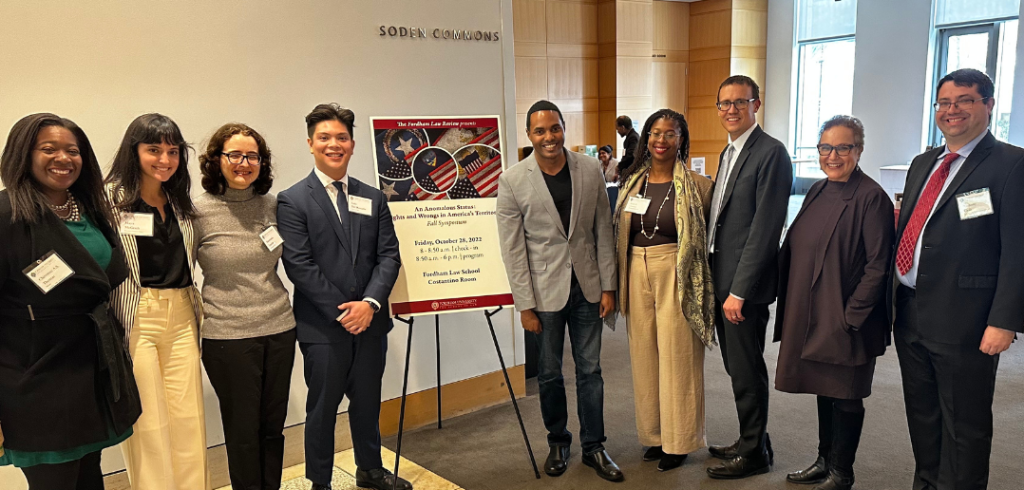On October 27 to 28, the Fordham Law Review held a two-day symposium on the subject of law in the American territories, which include the U.S. Virgin Islands, Puerto Rico, American Samoa, and Guam, among others. The symposium looked at the legal status and challenges facing the more than three million people living in the territories who—despite being U.S. citizens—often do not have the same rights as other citizens, including the right to vote for president.
“One of the big goals for both the organizers and myself was first establishing a baseline education for students about the law that governs territories,” said Maya McGrath ’23, executive symposia editor for the Fordham Law Review. “It’s largely an under-taught area of law. In fact, many students are not aware that the U.S. has territories to begin with.”
The first panel event, moderated by former Virgin Islands Bar Association President Anthony Ciolli, provided an introduction to what it’s like to practice law in the territories. Later in the day, the Law Review partnered with Fordham Law’s Trial Advocacy and Moot Court teams for an oral argument reenactment of United States v. Vaello-Madero, a recent case in which the U.S. Supreme Court ruled that the Constitution does not require Congress to give citizens of Puerto Rico access to Social Security benefits.

In his keynote address at the symposium, U.S. Representative Ritchie Torres discussed his support of legislation targeting social and economic issues facing Puerto Rico. Torres, who has Puerto Rican heritage, grew up in public housing in the South Bronx before becoming the city’s youngest elected official.
“Puerto Rico has known a level of suffering that is hard to fathom,” said Torres. “It has seen a perfect storm of both natural and manmade disasters. From a $72 billion debt crisis to Hurricane Irma, to Hurricane Maria—which led to the longest blackout in US history—to a 6.5 magnitude earthquake which devastatedthe energy grid … to Hurricane Fiona. The island is recovering from the aftermath of all of these crises.”
The symposium was “a collaborative effort” between a number of students and organizations, said McGrath, including Professor Natalie Gomez Velez from CUNY School of Law, founder of Equally American Neil Weare, The Voting Rights and Democracy Project led by Professors Jerry Goldfeder and John Rogan, and a number of student volunteers.
“One of my favorite things about Fordham is just how much everybody’s willing to lend a hand, whether that’s last minute items or throughout the six months of planning that it takes to put together an event like this,” McGrath said.
The end result was one of the largest symposia ever held by the Law Review, and an engaged audience of between 250 and 350 attendees throughout the day, said McGrath.
“I was excited that people were gaining an actual sense of what life is like [in the U.S. territories], as well as learning about the general legal principles that govern the territories,” she said. “The goal is [for the audience]to come out with some sense of understanding and conceptualizing an issue that does affect so many—nearly 3.6 million people.”
Thank you @FordhamLawNYC for hosting an excellent Symposium about the Insular Cases and U.S. Territories!@EquallyAmerican pic.twitter.com/mzwudM1oRC
— New York State Bar Association (@NYSBA) October 30, 2022
An Anomalous Status: Rights and Wrongs in America’s Territories Fall Symposium 2022, Day 1 Part 1 from Fordham Law School on Vimeo.
An Anomalous Status Rights and Wrongs in Americas Territories Fall Symposium, Day 1 Part 2 from Fordham Law School on Vimeo.
An Anomalous Status: Rights and Wrongs in America’s Territories – Fall Symposium Day 2 (Fall 2022) from Fordham Law School on Vimeo.

